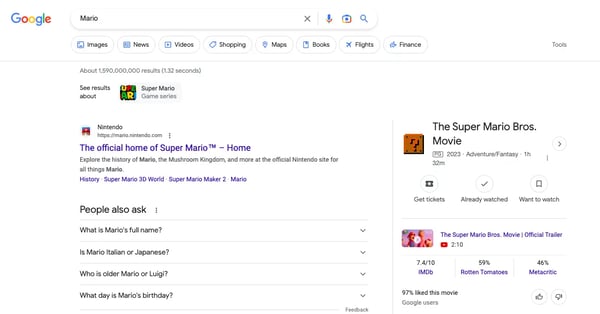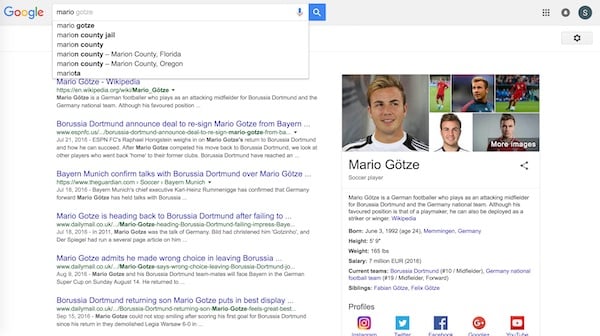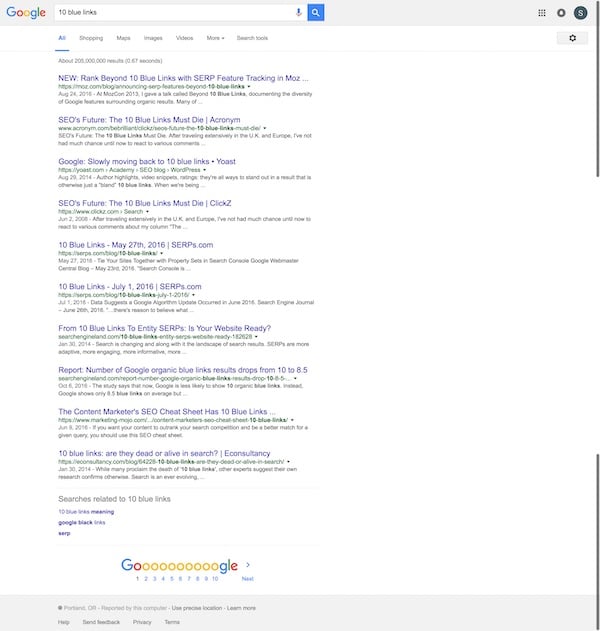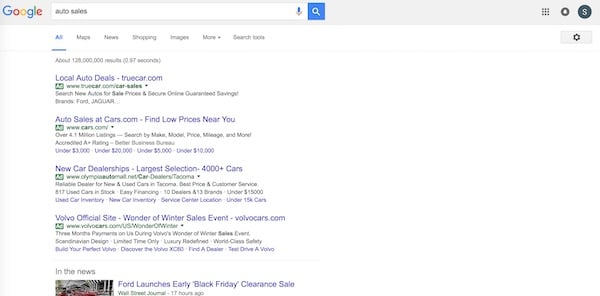Why doesn't my website appear in Google Search?
For such a simple question, the answer sure is hard to nail down.
Google processes 40,000 of our searches per second worldwide, but even the most seasoned search engine optimization (SEO) experts among us can't predict how the search results are ranked any better than a coin flip.
That said, learning the basics of search engine functionality and a bit about how people use search engines will give you a better understanding of the context of the answer to your question, if not the answer itself.
Here's what we do know about Google search, and some possible answers to the question at the top of this post:
Google's ultimate goal is to give users the best experience possible
Item one on Google's official "What We Believe" page is, "Focus on the user and all else will follow."
If you look closely, you can see this shine through in many of Google's products, including search. This means Google wants to rank websites based on data its users provide (via their behavior) about each website's quality.
The list of specific data Google uses to is likely very long and certainly very uncertain, but remember this: if people really get a ton value out of your website pages, Google's ranking algorithm is probably smart enough to notice that, and rank your pages higher for keywords that those people are searching for.
Search results pages look different for different people and different contexts
Just as Google uses data from its users to rank websites, it uses data from them to tailor what search results page looks like.
The simplest example here involves your geographic location. For example, the search results page for the search keyword "electricians," will be full of results for
If you’re in Minneapolis, a search for the keyword “electricians” would likely produce a page full of map and website results for electricians in Minneapolis.
.jpg?width=600&name=5c6d89ab7a8e2466c2376898_electricians%20%20%20Google%20Search%20(1).jpg) Source: Google
Source: Google
But if you’re in Portland and searched the exact same keyword, you’d see map and website results for Portland electricians.
.jpg?width=600&name=5c6d89abe78958754d09fae6_Screen%20Shot%202016-11-03%20at%207.38.28%20AM%20(1).jpg)
In addition to customizing results pages based on your location, Google also customizes them based on you and your behavior.
When searching the keyword “Mario,” for example, most people would get results featuring the iconic Nintendo character.

But if your recent Google search history includes queries about famous German soccer players and you’ve watched a lot of highlights from Borussia Dortmund on YouTube (which is owned by Google), your results page might instead feature 2014 World Cup hero Mario Götze.

A hat tip to Distilled’s Will Critchlow, from whom I stole this example.
And that’s not all. Google can also tailor your search based on whether it comes from a phone or desktop computer, whether it comes from an iPhone or Android and whether or not you’re signed into a Google account.
What does this mean?
If you’re optimistic, it means just because your website doesn’t appear in your search engine results, it might for someone else, like your customer. But even if you’re not, it should at least illustrate one reason why your website “isn’t coming up.”
It matters less than you think to rank for your top handful of keywords
If you’re not satisfied with the amount of traffic Google and other search engines are sending to your site, it’s important to not fall into the trap of focusing on ranking for a few select keywords.
While it’s probably true that you could drive a ton of quality traffic to your site if you ranked for the No. 1, No. 2, and No. 3 most important keywords to your business, there are a few other very important things to keep in mind here.
Even if you’re No. 1, you might still not be in the No. 1 position
For some keywords, ranking No. 1 (or No. 2 or No. 3) matters a lot less than at used to because of Google’s results page redesigns in recent years.
All search results pages used to look the same: 10 blue links.

Now, they’re more likely to look like this.

Look at all that! The first organic website result doesn't appear until you scroll halfway down the page.
If it wasn’t enough to have to compete with other websites, you now have to compete with paid search results, knowledge graph results, map results, news results … the list goes on and on.
In fact, less than 3% of all search results now feature the classic “10 blue links” look.
The most generic keywords are often the toughest to rank for
If you think a keyword is valuable to your business, there’s a good chance a lot of your competitors do as well. That means they’re probably trying to rank for it, too.
There's also the matter of directory sites like Yelp and TripAdvisor. These sites aggregate data from you and your competitors in a way many users prefer, which means it will be nearly impossible for any one business to outrank them.
The more valuable and obvious a keyword is, the tougher it’s going to be to rank for.
When it comes to keywords, quantity is almost as important as quality
It’s certainly important to rank for high-quality keywords. What good is ranking for a keyword if the traffic it produces isn’t ever going to be your customer?
But what if you could rank for a whole bunch of quality keywords?
Consider this: someone who’s looking for a payroll software for their business might search Google for “payroll software.” But depending on their specific needs and where they are in the buyer’s journey, they also might search for:
- “make payroll easier”
- “how can I make my accounting team more efficient”
- “help with payroll”
- “what to look for in payroll software”
- “payroll software comparison”
The possibilities here are almost limitless. If you could rank highly for those and the countless other “long-tail” keywords related to your product, you could drive a lot of high-quality traffic.
So if the answer to the question, “Why isn’t my website coming up,” is “It doesn’t really matter that much,” what does matter?
How to tell how much traffic Google is sending to your website
A better (but not perfect) way to monitor your search performance is to measure the traffic Google and other search engines are sending to your website
If you’re using Google Analytics or another analytics tool, it’s fairly easy to tell how much search engine traffic your website is getting. If you don’t use Google Analytics, it can be easily installed; you’ll just have to wait at least a few weeks to get enough data to make any meaningful conclusions.
Simply sign in to your account and click on “Reporting” from the navigation. Then click “Acquisition," "All Traffic,” and "Source/Medium."
You should see a table like the one below showing all of your traffic broken down by source. What we’re interested in is the row labeled “google/organic,”which includes all unpaid traffic that came to your site from search engines.
 Source: Google Analytics
Source: Google Analytics
By toggling the date in the upper right hand part of the page, you can see how much traffic Google and other search engines are driving to your site over any period of time.
If you’re ready to take the next step in assessing your search performance, try setting up Google Analytics Goals, which allow you to measure the amount of leads (or sales) search engines are sending your way.
So how do I get more traffic and leads from Google, then?
If you’re convinced your business needs to get more out of search engines, the best way to do so is to create high-quality website content that people can find using search engines no matter where they are in the buyer’s journey.
This is where the “long-tail keywords” I discussed above come in. Let’s revisit the keyword examples from earlier and match those up with website content that could be created in an effort to rank for those keywords:
- To target people searching for “make payroll easier,” you could an infographic entitled “10 Ways Small Businesses Can Make Payroll Easier in 2016”
- For “how can I make my accounting team more efficient,” a video series on the latest best practices in accounting management
- For “help with payroll,” a blog post entitled “How Business Owners Can Get Help With Payroll Without Hiring Outside Consultants”
- For “What to look for in payroll software,” an eBook titled exactly that
- For “payroll software comparison,” a webinar comparing the payroll software options on the market
By creating quality content that matches up with what your customers are searching for, you’ll have a chance to get them on your site, and maybe even converting them to leads.
An important note on quality: as I mentioned above, Google rewards content that its users find useful or interesting, so writing 20 very short, poorly-edited blog posts isn’t going to do the trick. Your content needs to be truly great to stand out and earn Google’s respect.
And don’t stop there. Create a buyer persona to get a better understanding of your ideal customers. Map out their buyer’s journey, and create content around each step in that buyer’s journey.
Conclusion
Why don't I see my website when I do a Google search?
There are a lot of potential answers to this question, but this is the most important one:
You're focusing on the wrong thing.
Instead of focusing on search rank for any one keyword, you should be focusing on:
- making a website that users like (which, in turn, Google will like)
- thinking about the long-tail keywords your customers might be searching for
- developing content that matches up with those keywords and matches up with your buyers' journeys
If you’d like to learn more, I’d recommend checking out our guide to inbound marketing with SEO here.
Topics: Search Engine Optimization






